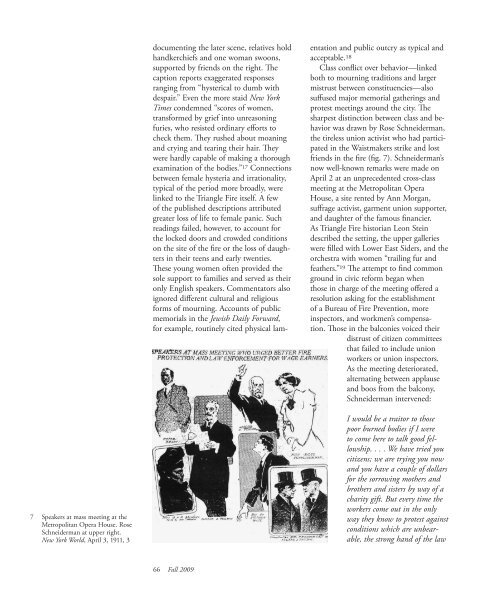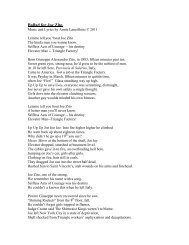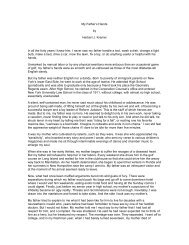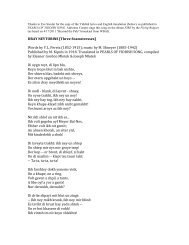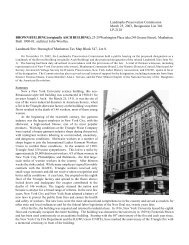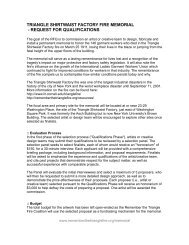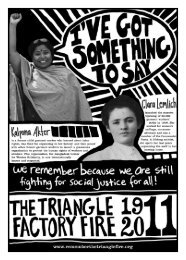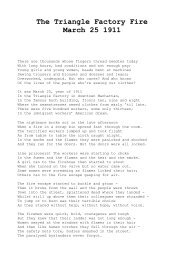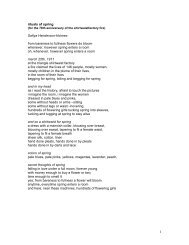Memorial - Remember the Triangle Fire Coalition
Memorial - Remember the Triangle Fire Coalition
Memorial - Remember the Triangle Fire Coalition
You also want an ePaper? Increase the reach of your titles
YUMPU automatically turns print PDFs into web optimized ePapers that Google loves.
7 Speakers at mass meeting at <strong>the</strong><br />
Metropolitan Opera House. Rose<br />
Schneiderman at upper right.<br />
New York World, April 3, 1911, 3<br />
documenting <strong>the</strong> later scene, relatives hold<br />
handkerchiefs and one woman swoons,<br />
supported by friends on <strong>the</strong> right. The<br />
caption reports exaggerated responses<br />
ranging from “hysterical to dumb with<br />
despair.” Even <strong>the</strong> more staid New York<br />
Times condemned “scores of women,<br />
transformed by grief into unreasoning<br />
furies, who resisted ordinary efforts to<br />
check <strong>the</strong>m. They rushed about moaning<br />
and crying and tearing <strong>the</strong>ir hair. They<br />
were hardly capable of making a thorough<br />
examination of <strong>the</strong> bodies.” 17 Connections<br />
between female hysteria and irrationality,<br />
typical of <strong>the</strong> period more broadly, were<br />
linked to <strong>the</strong> <strong>Triangle</strong> <strong>Fire</strong> itself. A few<br />
of <strong>the</strong> published descriptions attributed<br />
greater loss of life to female panic. Such<br />
readings failed, however, to account for<br />
<strong>the</strong> locked doors and crowded conditions<br />
on <strong>the</strong> site of <strong>the</strong> fire or <strong>the</strong> loss of daughters<br />
in <strong>the</strong>ir teens and early twenties.<br />
These young women often provided <strong>the</strong><br />
sole support to families and served as <strong>the</strong>ir<br />
only English speakers. Commentators also<br />
ignored different cultural and religious<br />
forms of mourning. Accounts of public<br />
memorials in <strong>the</strong> Jewish Daily Forward,<br />
for example, routinely cited physical lam-<br />
66 Fall 2009<br />
entation and public outcry as typical and<br />
acceptable. 18<br />
Class conflict over behavior—linked<br />
both to mourning traditions and larger<br />
mistrust between constituencies—also<br />
suffused major memorial ga<strong>the</strong>rings and<br />
protest meetings around <strong>the</strong> city. The<br />
sharpest distinction between class and behavior<br />
was drawn by Rose Schneiderman,<br />
<strong>the</strong> tireless union activist who had participated<br />
in <strong>the</strong> Waistmakers strike and lost<br />
friends in <strong>the</strong> fire (fig. 7). Schneiderman’s<br />
now well-known remarks were made on<br />
April 2 at an unprecedented cross-class<br />
meeting at <strong>the</strong> Metropolitan Opera<br />
House, a site rented by Ann Morgan,<br />
suffrage activist, garment union supporter,<br />
and daughter of <strong>the</strong> famous financier.<br />
As <strong>Triangle</strong> <strong>Fire</strong> historian Leon Stein<br />
described <strong>the</strong> setting, <strong>the</strong> upper galleries<br />
were filled with Lower East Siders, and <strong>the</strong><br />
orchestra with women “trailing fur and<br />
fea<strong>the</strong>rs.” 19 The attempt to find common<br />
ground in civic reform began when<br />
those in charge of <strong>the</strong> meeting offered a<br />
resolution asking for <strong>the</strong> establishment<br />
of a Bureau of <strong>Fire</strong> Prevention, more<br />
inspectors, and workmen’s compensation.<br />
Those in <strong>the</strong> balconies voiced <strong>the</strong>ir<br />
distrust of citizen committees<br />
that failed to include union<br />
workers or union inspectors.<br />
As <strong>the</strong> meeting deteriorated,<br />
alternating between applause<br />
and boos from <strong>the</strong> balcony,<br />
Schneiderman intervened:<br />
I would be a traitor to those<br />
poor burned bodies if I were<br />
to come here to talk good fellowship.<br />
. . . We have tried you<br />
citizens; we are trying you now<br />
and you have a couple of dollars<br />
for <strong>the</strong> sorrowing mo<strong>the</strong>rs and<br />
bro<strong>the</strong>rs and sisters by way of a<br />
charity gift. But every time <strong>the</strong><br />
workers come out in <strong>the</strong> only<br />
way <strong>the</strong>y know to protest against<br />
conditions which are unbearable,<br />
<strong>the</strong> strong hand of <strong>the</strong> law


